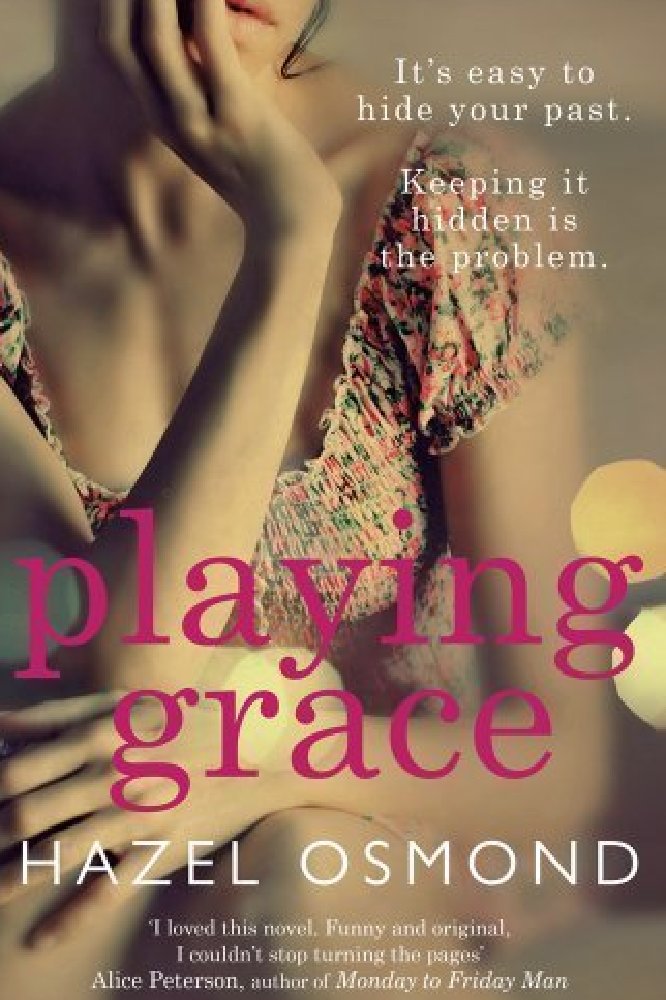
Playing Grace
Playing Grace is about Grace who is a very calm, very organised person who likes her routines and works for a company that organises art tours in London. When an outgoing, rule-breaking young American guy joins the company to give tours on more cutting edge art, weird things start to happen – pictures get stolen from galleries and Grace’s life starts to unravel. As it does, the reason why Grace keeps herself so in control, start to emerge.
I have a lot of fun with the English/American relationship and although I love all my leading men, Tate Jefferson is just brilliant – a fantastic pain in the ass who might just turn out to be a pain in the heart.
Why are workplace romances so appealing for the reader?
Work is one of the few places where you have to get along (more or less) with people you might not normally gravitate towards. All different kinds of people get thrown together and it makes for great tension – some of it sexual! Having to keep deep feelings under wraps during the working day is a fascinating start for any plot.
You won the Woman and Home short story competition in 2008, so please tell us about your submission.
The competition’s theme was ‘Passion’ and I didn’t want to write a conventional love story - so I wrote one from the viewpoint of a woman who is married to a man who loves his cars more than her, and how she deals with that. I got the idea from an incident when I was working - one of the Account Executives took delivery of his new BMW and ran his hand along it in a very worrying way. Smitten.
I had lots of reaction from women about the story – one sidled up to me at a parents’ evening at school and said, ‘With my husband it’s not cars, it’s ****** golf!’ I think the story hit a nerve.
The First Time I Saw Your Face also has the theme of a secret, so why is this a device you like to use in your story telling?
Secrets intrigue me for all kind so reasons. I think it’s incredible how people can keep them hidden for years and what that takes. I’m also fascinated by the idea that before a secret is exposed, people think they know what’s real, and then it comes out and everything shifts. They are a catalyst in a story and make for great drama. Every family has them, everyone’s got at least one. Trust me.
Do you have a preference between short story writing and novel writing?
Not really. I like the luxury a novel brings to develop a story over a wider spread of time and to dig deeper into a group of people, but on the other hand I enjoy the discipline of having to convey something living and breathing in just 5.000 words.
Who do you most like to read?
I’m a bit of a reading ‘tart’, I like to have a ‘go’ at most genres and I’m incredibly lucky to have a great bookshop just down the road and Helen who owns it will leap on me and say, ‘Hazel, you’ve got to read this, you’ll love it.’ She’s usually right … I tend to really love anything that has a lot of emotion but also a wry look at life. And obviously I write romances, so I read a fair few of them. There’s nothing like falling for the lead character and not being able to put the book down.
If you could have dinner with any writer who would it be and why?
A very tricky question. I could have given you at least 20 I’d like to sit next to, but for all round humour, an interesting chat on words and language and a good gossip about Shakespeare, it would have to be Bill Bryson.
What is your writing process?
I have two really, when I’m a long way out from a deadline I do lots of thinking about plot and characters and research all kinds of things that might crop up. I also clean out the kitchen cupboards, go for coffee with friends, paint my nails, stare into space.
Nearer a deadline, the book’s in my head all the time and I write after I drop the girls at school, write after I pick them up, write in the evening. I have to be really immersed in the book at that point.
And I do plan, but sometimes the characters develop a life of their own and go off and do things I didn’t think they were going to – which means I have to adapt to that. I really enjoy that bit, when a character says ‘you’ve got this planned, but this is how I would really react’ – sounds weird but it happens.
What is next for you?
Hopefully more books and I’ve neglected my short stories recently. There are some good prizes out there I’ve got my eye on, so I’m going to go for them.

